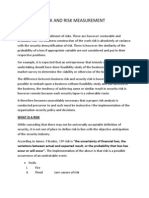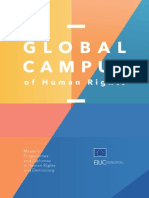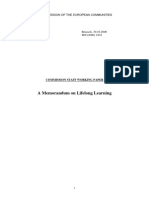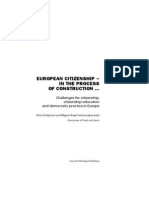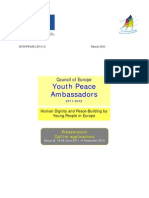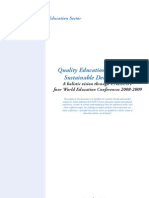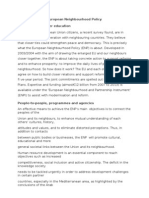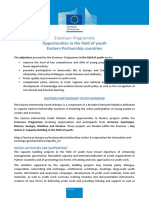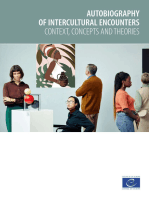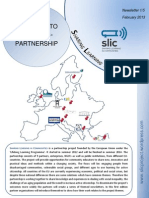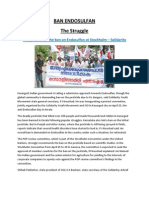Review
Review
Uploaded by
matevargaCopyright:
Available Formats
Review
Review
Uploaded by
matevargaCopyright
Available Formats
Share this document
Did you find this document useful?
Is this content inappropriate?
Copyright:
Available Formats
Review
Review
Uploaded by
matevargaCopyright:
Available Formats
8.
Review of The Budapest Declaration at the Seminar on Sofia in
May 2009 with a focus on Training and Learning
Building European civil society through community development:
opportunities for training and learning
Suggested new policy statement for TLCD
8.1 Proposal:
Participants in the Sofia Seminar should give feedback on the review of the
Budapest Declaration. A draft review statement should be sent from the
Consortium Meeting on Training and Learning for Community Development in
Sofia to the IACD, CEECN and HACD. After a short process of amendment,
endorsement and identification of appropriate individuals, it should be sent to
named people in relevant bodies in the Council of Europe and named people in
relevant bodies in the European Union by a group representing:
CEBSD
CEECN
IACD
TLCD Consortium
TLCD partners should also send it to the relevant national agency or agencies.
In September 2009, there should be follow-up contact with national agencies
and European institutions requesting specific proposals related to budget lines
for 2010.
Background 2004-2009 with relevant extracts from the Budapest Declaration
“One hundred and thirty community workers, researchers, donors and policy-makers, and
representatives from government, civil society organisations and community groups, from 33
countries across the European Union and beyond, met in March 25-28 in 2004 at an
international conference, to prepare for the accession of ten new countries to the EU. The
conference was sponsored by the International Association for Community Development, the
Combined European Bureau for Social Development, and the Hungarian Association for
Community Development under the patronage of the President of Hungary. ”
A key conference objective was to agree a common statement on community
development in Europe, to be directed to the EU, national governments and
other key stakeholders – see statement below. This statement was
disseminated widely and still ripples around Europe.
One of the specific outcomes of the declaration was the decision by CEBSD to
work on Community Development in relation to European Union objectives on
Lifelong Learning. CEBSD obtained funding from the European Union and led a
project under the Grundtvig Programme in 2005-2006 followed by a Consortium
under Key Activity 4 on dissemination from 2007-2009 to pursue the articles on
training and learning in the Budapest Declaration.
The following articles on Training and Learning produced in
Budapest in 2004 are now the subject of a review at the seminar in
Sofia in May 2009.
Articles 4, 5 and 6 on Community development training
For community development to make the most effective contribution to building civil
society, the EU needs to facilitate a common framework for training and learning for
community development based on core community development values, knowledge
and skills, with training materials based on best practices. The development of training
is at present quite uneven but good experience should be used to suit local conditions.
This common framework for learning and training needs to be resourced and adapted
for use in each member state, based on dialogue with all stakeholders, and developed
from the ‘bottom up’. The common overarching framework should not be used to
export any one particular political or economic perspective.
Learning and training for community development and for active citizenship must be
part of a continuum for lifelong learning and critical reflection – from citizenship
education for children and young people through to community activists and
volunteers, professionals working with communities and decision-makers at different
levels. There should be pathways for progression through and across different levels
of learning and training.
Articles on Community development, lifelong learning and cultural development
Articles 21, 22 and 23
Adult education should extend beyond vocational training and should be seen as a
right and provided on a non-commercial, not-for-profit basis.
Lifelong learning should be defined in policies as including community-based and
citizenship education. By a community-based model, we mean building on local skills,
resources, strengths and needs, and recognising issues of gender, cultural diversity,
sustainable development and inclusion; in short, offering ‘access to diversity and
diversity of access’.
There is a continued need for experimentation, within a secure and sustainable funding
framework at local, national and EU levels. This implies a commitment to medium and
long-term funding and provision. Programmes such as Grundtvig should be further
developed with increased budgets and should prioritise trans-national mobility for
community activists and local groups alongside community development
professionals.
Articles 28, 29 30 on equality as foundation for training and learning:
In support of these goals, the EU and member states should create and support
structures and agencies, which pursue the aims of racial equality and cross-cultural
understanding and awareness. The EU and member states should at the same time
emphasise the positive aspects of a wider and more diverse Europe.
The EU and member states should acknowledge, through policy and funding development,
that community development has a critical role to play in engaging people in increasingly
diverse communities through inclusive methods. This may be done by building bridges
between majority and minority communities, including in situations of conflict.
You might also like
- Installation Manual - 3P678635-3E - RXYQ-BYMDocument68 pagesInstallation Manual - 3P678635-3E - RXYQ-BYMignatiusglenNo ratings yet
- Risk and Risk MeasurementDocument18 pagesRisk and Risk MeasurementEzekiel Ogaga OvbioghorNo ratings yet
- Manu Kant: Executive SummaryDocument6 pagesManu Kant: Executive SummarymanukleoNo ratings yet
- CES (Presentation Notes)Document5 pagesCES (Presentation Notes)didacgpNo ratings yet
- Community BasedDocument1 pageCommunity BasedmatevargaNo ratings yet
- The Consortium On Training and Learning For Community DevelopmentDocument4 pagesThe Consortium On Training and Learning For Community DevelopmentmatevargaNo ratings yet
- Relay To LabDocument4 pagesRelay To LabmatevargaNo ratings yet
- p2p Leaflet enDocument2 pagesp2p Leaflet enMargarita IoannidouNo ratings yet
- Course 2 - MPE - 2012-2013 - DecryptedDocument19 pagesCourse 2 - MPE - 2012-2013 - DecryptedLaur GoeNo ratings yet
- Guidebook To Eu Decision-Making in Education and TrainingDocument56 pagesGuidebook To Eu Decision-Making in Education and TrainingSantiago GarcíaNo ratings yet
- Eurydice 2012Document146 pagesEurydice 2012mendiguchiaNo ratings yet
- Salto Brochure WebDocument19 pagesSalto Brochure WebAndjela MartinovićNo ratings yet
- Discussion Paper On Open-Method of Co-OrdinationDocument5 pagesDiscussion Paper On Open-Method of Co-OrdinationmatevargaNo ratings yet
- Cele 8 Competențe CheieDocument6 pagesCele 8 Competențe CheiealecsandrameNo ratings yet
- Why Is Education Fundamental?: Unione Degli Studenti - OBESSUDocument6 pagesWhy Is Education Fundamental?: Unione Degli Studenti - OBESSUEvelyn RamosNo ratings yet
- Schüler Helfen Leben Sarajevo Strategic Plan 2022-2027Document6 pagesSchüler Helfen Leben Sarajevo Strategic Plan 2022-2027SasaNo ratings yet
- Osnabrueck Declaration Eu2020Document13 pagesOsnabrueck Declaration Eu2020Mariam IoselianiNo ratings yet
- Sustdev enDocument99 pagesSustdev enAura MateiuNo ratings yet
- GC Brossura 2014Document11 pagesGC Brossura 2014ec_eiucNo ratings yet
- Manual for the design of a training course on intercultural competence - Part 1: The core principles of the Council of Europe intercultural integration modelFrom EverandManual for the design of a training course on intercultural competence - Part 1: The core principles of the Council of Europe intercultural integration modelNo ratings yet
- Intercultural and Citizenship Education: Non-: EventDocument20 pagesIntercultural and Citizenship Education: Non-: EventAhmad ArifNo ratings yet
- Memorandum On Lifelong LearningDocument36 pagesMemorandum On Lifelong LearningANA KARINA MUNOZ GUTIERREZNo ratings yet
- Paper1 XIDASDocument115 pagesPaper1 XIDASAnil KumarNo ratings yet
- Euro Med CourseDocument8 pagesEuro Med CourseanisoalaNo ratings yet
- Oscar Wilde Portretul Lui Dorian GrayDocument3 pagesOscar Wilde Portretul Lui Dorian GrayDobrea Madalina Georgiana0% (1)
- Concretefuturobjectiv Oth Enl t02Document25 pagesConcretefuturobjectiv Oth Enl t02cristina2908No ratings yet
- Introduction To The Young Mediterranean Voices Programme: Aims and ObjectivesDocument2 pagesIntroduction To The Young Mediterranean Voices Programme: Aims and ObjectivesMęawy MįlkshãkeNo ratings yet
- Salto Mag FinalDocument20 pagesSalto Mag FinalElif TahmisciogluNo ratings yet
- Integration of Migrants and Refugees - Benefits For All Parties InvolvedDocument20 pagesIntegration of Migrants and Refugees - Benefits For All Parties Involved2157060155No ratings yet
- 2003 CCF Annual ReportDocument6 pages2003 CCF Annual ReportCivil KollégiumNo ratings yet
- Hat Is A Mobility ProjectDocument2 pagesHat Is A Mobility ProjectonixrsNo ratings yet
- Guide - Part B - KA1 - Mobility ProjectsDocument3 pagesGuide - Part B - KA1 - Mobility ProjectsMarisa CostaNo ratings yet
- FINAL MarrakechFrameworkForActionENDocument11 pagesFINAL MarrakechFrameworkForActionENKarabo LesalaNo ratings yet
- TC Youth AdvocacyDocument5 pagesTC Youth Advocacybot01042006No ratings yet
- 2000 CCF Annual ReportDocument8 pages2000 CCF Annual ReportCivil KollégiumNo ratings yet
- Europeancitizenship PubDocument232 pagesEuropeancitizenship PubInés PlasenciaNo ratings yet
- 01.08.27 - Ec Memorandum On Lifelong Learning - Ceji, Epto and Education For LifeDocument9 pages01.08.27 - Ec Memorandum On Lifelong Learning - Ceji, Epto and Education For LifeBård BrendenNo ratings yet
- Communitarian Economic Development - Europen Commission (2014)Document6 pagesCommunitarian Economic Development - Europen Commission (2014)Felipe CorreaNo ratings yet
- 2011 Youth Peace Ambassadors Presentation enDocument10 pages2011 Youth Peace Ambassadors Presentation enВиктор МилошевскиNo ratings yet
- Beijing Conference Report PDFDocument70 pagesBeijing Conference Report PDFCRADALLNo ratings yet
- Training and Learning For Community Development in EuropeDocument8 pagesTraining and Learning For Community Development in EuropematevargaNo ratings yet
- 2018gr Summary en WebDocument38 pages2018gr Summary en WebChristian MuniveNo ratings yet
- Manual for the design of a training course on intercultural competence - Part 2: Concepts related to the Council of Europe intercultural integration modelFrom EverandManual for the design of a training course on intercultural competence - Part 2: Concepts related to the Council of Europe intercultural integration modelNo ratings yet
- Quality EducationDocument9 pagesQuality EducationWisal KhalilNo ratings yet
- 2008 CEMRY Background Document enDocument27 pages2008 CEMRY Background Document enDon Bosco Youth-Net ivzwNo ratings yet
- Erasmus Aims of A Mobility Project Ka1 2020 PDFDocument1 pageErasmus Aims of A Mobility Project Ka1 2020 PDFjrstockholmNo ratings yet
- ErasmusDocument20 pagesErasmusalexandreakono237No ratings yet
- TIME O5 Trainer Course Module 7 PDFDocument24 pagesTIME O5 Trainer Course Module 7 PDFAshraf MansourNo ratings yet
- Attachment 2 RecommendationsDocument3 pagesAttachment 2 RecommendationsEaP CSFNo ratings yet
- Education For Change Change For Education: ManifestoDocument42 pagesEducation For Change Change For Education: ManifestoCarolina CheptenariNo ratings yet
- Workstream 4Document2 pagesWorkstream 4lucvermeerschNo ratings yet
- Lifelong Learning ReportDocument10 pagesLifelong Learning ReportRaymond GironNo ratings yet
- Teaching and Learning: White Paper On Education and TrainingDocument70 pagesTeaching and Learning: White Paper On Education and TrainingmieszkowskaNo ratings yet
- European Neighbourhood PolicyDocument4 pagesEuropean Neighbourhood PolicyNicolae VutcariovNo ratings yet
- Depliant Erasmus Plus en PDFDocument6 pagesDepliant Erasmus Plus en PDFCelatuchiacNo ratings yet
- Youth For EaP Countries 2017Document3 pagesYouth For EaP Countries 2017dongratiNo ratings yet
- WWW Jugendfuereuropa deDocument16 pagesWWW Jugendfuereuropa deGabi NagyNo ratings yet
- Social Innovations Through New Partnerships: UNDP Experience in Lithuania 2006-2012Document104 pagesSocial Innovations Through New Partnerships: UNDP Experience in Lithuania 2006-2012UNDP in Europe and Central AsiaNo ratings yet
- New Eu Programmes 2014-2020 Overview: ObjectivesDocument7 pagesNew Eu Programmes 2014-2020 Overview: ObjectivesAdriana Ája KarbanováNo ratings yet
- Twinning For Tomorrow's WorldDocument23 pagesTwinning For Tomorrow's WorldGeorgia MavreaNo ratings yet
- International Implementation Scheme: United Nations Decade of Education For Sustainable Development (2005-2014)Document31 pagesInternational Implementation Scheme: United Nations Decade of Education For Sustainable Development (2005-2014)Isabel PretoNo ratings yet
- Call For Applications YPC 2020 PDFDocument6 pagesCall For Applications YPC 2020 PDFArzu AbbasovaNo ratings yet
- Autobiography of intercultural encounters: Context, concepts and theoriesFrom EverandAutobiography of intercultural encounters: Context, concepts and theoriesNo ratings yet
- Feb.2014 3rd - Us.mentors Newsletter Final.01Document16 pagesFeb.2014 3rd - Us.mentors Newsletter Final.01matevargaNo ratings yet
- CPU15 General InfoDocument2 pagesCPU15 General InfomatevargaNo ratings yet
- T Slic Slic: HE Impact ImpactDocument22 pagesT Slic Slic: HE Impact ImpactmatevargaNo ratings yet
- 3rd NL Dec 2013-1 SLIC 2Document33 pages3rd NL Dec 2013-1 SLIC 2matevargaNo ratings yet
- How To Make The Learning Process More InclusiveDocument25 pagesHow To Make The Learning Process More InclusivematevargaNo ratings yet
- Global Perspective On Social-Economic TransformationDocument24 pagesGlobal Perspective On Social-Economic TransformationmatevargaNo ratings yet
- CCF For Active CitizensDocument16 pagesCCF For Active CitizensmatevargaNo ratings yet
- The Most Effective Nonformal and Informal Methods of Teaching and LearningDocument19 pagesThe Most Effective Nonformal and Informal Methods of Teaching and LearningmatevargaNo ratings yet
- CeeCN 2012 WebDocument23 pagesCeeCN 2012 WebmatevargaNo ratings yet
- Strategic Plan: Prepared By: Center For Community Organizing Banská Bystrica SlovakiaDocument14 pagesStrategic Plan: Prepared By: Center For Community Organizing Banská Bystrica SlovakiamatevargaNo ratings yet
- Year (S) of Citizens: Citizen Participation University 2013Document4 pagesYear (S) of Citizens: Citizen Participation University 2013matevargaNo ratings yet
- Initiative To Organization 2 21.3.13Document8 pagesInitiative To Organization 2 21.3.13matevargaNo ratings yet
- A Role For Citizens and Other StakeholdersDocument23 pagesA Role For Citizens and Other StakeholdersmatevargaNo ratings yet
- SLIC - PresentationDocument7 pagesSLIC - PresentationmatevargaNo ratings yet
- 3rd US Mentor 16 Pages Updated Feb 4Document16 pages3rd US Mentor 16 Pages Updated Feb 4matevargaNo ratings yet
- Movements/activism - Hungary 2012.Document54 pagesMovements/activism - Hungary 2012.matevargaNo ratings yet
- W Slic-: Elcome To THE PartnershipDocument4 pagesW Slic-: Elcome To THE PartnershipmatevargaNo ratings yet
- Movements 230611 Amparo Rodrigo Spanish RevolutionDocument9 pagesMovements 230611 Amparo Rodrigo Spanish RevolutionmatevargaNo ratings yet
- CPU 2012 AGENDA - Draft-June29Document4 pagesCPU 2012 AGENDA - Draft-June29matevargaNo ratings yet
- Society Dancing Fashionable Bodies in enDocument22 pagesSociety Dancing Fashionable Bodies in enantogiroNo ratings yet
- FINA201 Topic 3 CH 6 Slides Valuations and Bonds PrintingDocument8 pagesFINA201 Topic 3 CH 6 Slides Valuations and Bonds Printingayushmaharaj68No ratings yet
- Alto OEX 600 Users ManualDocument18 pagesAlto OEX 600 Users ManualAlejandro Luna OlmosNo ratings yet
- PB 211Document17 pagesPB 211Jhuli Elizabeth CNo ratings yet
- Exxon Mobil New Refinery TrendsDocument45 pagesExxon Mobil New Refinery TrendsWong Yee Sun100% (1)
- Wapda Ots JobDocument2 pagesWapda Ots JobHassan AliNo ratings yet
- Emalou Moleta STS Chapter 2 Lesson 1 Human FlourishingDocument4 pagesEmalou Moleta STS Chapter 2 Lesson 1 Human Flourishingarman magbagoNo ratings yet
- 40.4 Project Schedule-NewDocument1 page40.4 Project Schedule-NewTanvir Shawon100% (1)
- GhjgyuiytuytDocument4 pagesGhjgyuiytuytLorelyn TriciaNo ratings yet
- CERQDocument2 pagesCERQShellyNo ratings yet
- 〈Small-Signal Transistor〉: Isahaya Electronics CorporationDocument4 pages〈Small-Signal Transistor〉: Isahaya Electronics Corporationperro sNo ratings yet
- Tommy John Surgery. Dr. ElattracheDocument49 pagesTommy John Surgery. Dr. Elattracheangel71carrillo100% (1)
- Problem Solving Using IRACDocument9 pagesProblem Solving Using IRACthroux100% (1)
- Victoria Guillén-Nieto, Hate Speech - Linguistic PerspectivesDocument210 pagesVictoria Guillén-Nieto, Hate Speech - Linguistic PerspectivesChrisNo ratings yet
- Wipsy MenuDocument14 pagesWipsy MenuBergas WibowoNo ratings yet
- EOI Exam AutomationDocument5 pagesEOI Exam AutomationNathan Samuel Obinwafor UzomaNo ratings yet
- Islami Social Studies Lesson Plan-2Document4 pagesIslami Social Studies Lesson Plan-2api-607132776No ratings yet
- Survey Design ChecklistDocument5 pagesSurvey Design ChecklistparameshNo ratings yet
- Class04 Chemistry G11 Homework Sep 25-29Document4 pagesClass04 Chemistry G11 Homework Sep 25-29Erin100% (1)
- Solidarity and EndosulfanDocument22 pagesSolidarity and EndosulfanbaskanjirNo ratings yet
- Wall Inteference Effects - Analysis and Correction For Automotive Wind TunnelsDocument10 pagesWall Inteference Effects - Analysis and Correction For Automotive Wind TunnelsVyssionNo ratings yet
- Documentatie MobilpayDocument12 pagesDocumentatie MobilpayMihai IsvoranuNo ratings yet
- Cause and Effect in Population Declines of Migratory BirdsDocument9 pagesCause and Effect in Population Declines of Migratory BirdsHashim AliNo ratings yet
- 742236V01Document2 pages742236V01David Antonio Matias VelascoNo ratings yet
- Adobe Scan 23 Feb 2022Document1 pageAdobe Scan 23 Feb 2022ankita shreepadNo ratings yet
- SumerDocument16 pagesSumerJuneyell Escobar100% (1)
- Understanding The Self Syllabus 2nd Sem 2021-22Document7 pagesUnderstanding The Self Syllabus 2nd Sem 2021-22Mary Crisza RentoriaNo ratings yet

